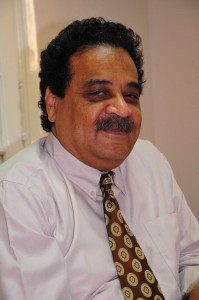
I do not want to spread panic amongst people especially those who are enemies of the Brotherhood, but I am beginning to think that there is a possibility that the Brotherhood will return to the forefront of the political scene.
The main reason for the resurgence of the Brotherhood is the aggressive methods employed by supporters of the police state, specifically those supporting former Minister of Interior Habib Al-Adly. As a result of these brutal tactics the Brotherhood is gaining momentum every day.
After the 25 January Revolution, Al-Adly supporters disappeared and those who attempted to sneak into the political scene were met with angry crowds – who in turn were met with police brutality. When the Brotherhood took over, at first Al-Adly supporters inside the ministry of interior cooperated with the new leadership. The cooperation included the dismissal of the officers who specialized in combating terrorism, as well as complying with police brutality at the presidential palace. These supporters also included media personalities as well as officers inside the Ministry of Interior. They did not only abuse people, but also gave a rancid reputation to the rest of the ministry. Even the officers who were not involved in any brutality [I believe they make up the majority of the ministry] and refused to participate in any violence were tainted by this rouge group. Innocent officers were forced to battle with the angry protesters of the 25 January revolution throughout the country.
In addition, Al-Adly’s men were absent from the battle against the Brotherhood in the period between parliamentary elections and the weeks leading up to 30 June protests. For a time these men were restricted to areas in and around the ministry. This confinement reflected the group’s complicity with the Muslim Brotherhood. When some democratic parties succeeded in dismantling the Brotherhood, Al-Adly supporters came back to the scene feigning support for the 30 June protests. Supporters masked themselves behind various democratic entities and personalities, placing themselves at the forefront of the political scene all the while maintaining their anonymity.
Analysts have explained the fact that Al-Adly supporters are well aware of people’s animosity towards them. They were conversely aware of the prestige of, democratic entities and personalities. Moreover, supporters of the police state were unfamiliar with the methods of free political dialogue, which was a necessary asset in the battle against the Brotherhood. Some analysts further point out that they believe that these parties hid behind democratic institutions as they feared a return of the Brotherhood and the resulting backlash should they succeed at gaining power.
After 30 June, Al-Adly supporters believed that the fight against the Brotherhood was over; however they continued to manipulate the threat in order to exercise influence over the population. Their slogan became “nothing is louder than the sound of battle”. They systematically propagated a broad and ambiguous understanding of “Ikhwan” making it synonymous with anyone against the police state, which happened to include many democratic institutions.
Al-Adly supporters were joined by those who wanted a new dictator and supporters of the “administrative reform project.” As a result , they have assumed a role at the forefront of the political scene, becoming more influential every day. Their influence has reached beyond the media and has been successful in implementing oppressive legislation such as ratification of the controversial Protest Law.
It is also important to note the timing of the law- which has sent a message to the democratic entities indicating the end of the alliances of 30 June. Moreover, these parties have exerted considerable effort to encourage democrats to vote against the newly drafted constitution. Should the democrats concede they in effect will have excluded themselves from the democratic process and the political life of the country.
The passing of the Protest Law was not enough, for Al-Adly supporters, further sought to enforce it in the most repulsive way. They did not just arrest peaceful protesters, but also beat them in a way sadly reminiscent of their violent past. Meanwhile, the Brotherhood is free to protest anyplace they choose.
As a result of pressure to release the detained protesters, all protesters were released with the exception of Hossam Hassan, member of the Egyptian Social Democratic Party’s high commission. In addition, a warrant was issued for 10 member of the Social Democratic Party in Assiut simply because they were involved in a peaceful protest. This further confirmed the ongoing battle between Al-Adly supporters and democratic entities throughout the country.
The real problem is not in the police state in itself as it is weak and obviously flawed. The real problem is that the methods of the Police State have encouraged the return of the Brotherhood. As oppression increases and thousands of Egyptians face injustice, those against the state grow in number. Citizens will first seek relief in democratic institutions, however a State lacking confidence will of course fail to meet their demands. An embittered citizenry, after a period of confusion, will ally themselves with the Brotherhood who appear the only cohesive opposition to the State. Since the police state does not engage in political dialogue, the Brotherhood will regain the support of the people despite their failed and in coherent rhetoric – a week political dialogue is always better than no speech at all.



